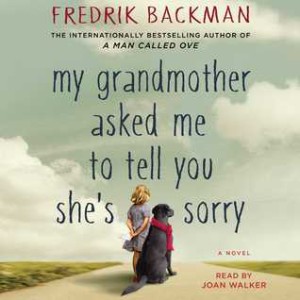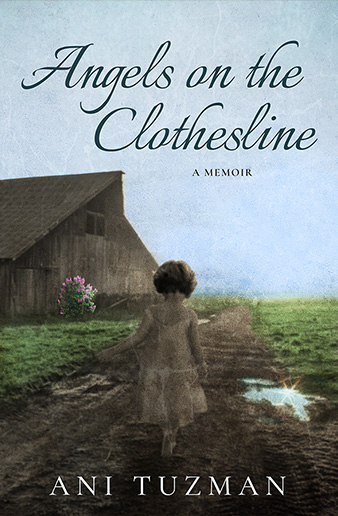My Grandmother Asked Me To Tell You She’s Sorry by Fredrik Backman was a delightful and stimulating read.
Almost eight-year-old Elsa is “different” and deliciously quirky, as are most of the characters who inhabit her apartment building and life—many having served as the basis for the characters that populate the fairytale Land of Almost-Awake and the Kingdom of Miamas that her granny wove around the two of them and then sustained with Elsa. (An aside: it just occurs to me as I am typing that I don’t believe Elsa’s granny is ever called or identified by her first name in the novel, despite being such a pervasive presence— a reflection of Elsa’ point of view driving the narrative.)
I liked so much about this novel. Elsa and those who surround her are intriguing, unpredictable, wonderfully “flawed” individuals—probably least of all her parents (and her stepfather) who are perhaps the most “normal,” least quirky of the batch. Elsa is unapologetically direct and relentlessly inquisitive. I listened to the audio and am very curious if my experience of Elsa, had I read the book first (and maybe even of Granny), would have been different or not? Elsa’s voice in the audio book was much like Granny’s voice actually, much older than her eight years. She is not a cute, sweet “almost eight-year-old”—utterly endearing yes, but only if one accepts her completely as she is.
I found myself wondering what it might be like to have Elsa for a neighbor, this “almost eight-year-old” that misses nothing, and knows that ‘most people are shits some of the time and no one is a shit all of the time.’* (*I listened to audiobook, so this is a close approximation.
While it is easy to use the adjective delightful about My Grandmother Asked Me to Tell You She’s Sorry, there are some very profound themes in the weave of this novel. One overriding theme I particularly treasure is that of human imperfection. There is no simple ideal woman, man or parent. In fact, Elsa’s completely devoted granny was a mother who left her own daughter often and for long spells in order to serve in hospitals throughout the world. Not only are we individually imperfect and always failing to be some ideal version of ourselves; our world too, fails to be ideal and easily controlled; we may, as did Granny, have to choose between being a surgeon saving lives in countries at war or a mother staying home with her daughter.
 But then Granny takes the job of full time granny, which highlights another theme: we humans change. Transformation is another central theme in the novel, and within that, the possibility of healing. Many of the characters in the novel were deeply wounded and traumatized by war. Healing doesn’t mean we are no longer strange and never “shits,” but it can mean that we can love and forgive. And here we have another theme (implicit in the title): the opportunity, which remains an option, to forgive; we can make the powerful and potentially transformative choice to forgive.
But then Granny takes the job of full time granny, which highlights another theme: we humans change. Transformation is another central theme in the novel, and within that, the possibility of healing. Many of the characters in the novel were deeply wounded and traumatized by war. Healing doesn’t mean we are no longer strange and never “shits,” but it can mean that we can love and forgive. And here we have another theme (implicit in the title): the opportunity, which remains an option, to forgive; we can make the powerful and potentially transformative choice to forgive.
A community unfolds strange petal by broken petal in the building where Elsa’s Granny lived and where Elsa’s mom and stepfather have their apartment (in a building it is rumored Granny won in a card game). Elsa learns to recognize the characters around her, at first jealously discovering that the fairy tale world she shared with her grandmother was not exclusively theirs. Elsa’s journey changes Elsa and her neighbors. It is not only the letters her granny left to Elsa to deliver, but also Elsa being Elsa (which her grandmother could count on) that precipitates healing in the letters’ recipients, including Elsa herself who finally forgives her granny for dying and leaving her. By the end of the book, which comes an eternity of fairy tales after it has begun, Elsa is still her “different” self, but she is also quite different from the original seven-year-old version of herself. She has not only turned eight, she….
Actually, since I really was not assured of a happy ending, considering that it might be a not so happy one, I will not go on now, but rather, will allow you not be so sure as you read (or listen to) this unforgettable novel.
And one last thought: May you, too, come away aware of superhero powers you did not even know you had, which just are part of you being you, like for example, your belly laugh…or being tentative…or baking really great biscuits…
G'Mar Chatima Tova
I close with this customary greeting whose literal meaning is: "a good final sealing." I will add to that: May you know the love of which you are made. What better than to know this?
With gratitude,
Ani
Your comments make this blog a conversation!
I would love to hear from you.
To avoid spam all comments are moderated by Ani. So if you don’t see your comment show up, not to worry; your comment will be up within within 24-48 hours





Your book review is the best expression of the way I feel about My Grandmother asked Me To Tell You She’s Sorry. I have read reviews by many who are bored, and even some who didn’t finish the book–for whatever reason. I found it delightfully funny and at the same time I found myself in tears. Having had a grandpa who filled my sister and me with fantasy, I do relate to the relationship told in this story. Many days my sister and I walked with Grandpa down “Money Street” where we found nickels and dimes as we heard stories about the how the money was growing on the plants near the sidewalk. As soon as we found enough, we magically were near “Marion’s Grocery Store” where we were able to purchase a bar of candy. His love was undisguised and unapologetic–out there for everyone to see just as Elsa’s grandmother was love for Elsa.
I love that the story was told in the voice of Elsa, and I know there are people who do not enjoy that style of writing but having been a teacher for many years, I heard that voice often.
Your book review is the best expression of the way I feel about My Grandmother asked Me To Tell You She’s Sorry. I have read reviews by many who are bored, and even some who didn’t finish the book–for whatever reason. I found it delightfully funny and at the same time I found myself in tears. Having had a grandpa who filled my sister and me with fantasy, I do relate to the relationship told in this story. Many days my sister and I walked with Grandpa down “Money Street” where we found nickels and dimes as we heard stories about the how the money was growing on the plants near the sidewalk. As soon as we found enough, we magically were near “Marion’s Grocery Store” where we were able to purchase a bar of candy. His love was undisguised and unapologetic–out there for everyone to see just as Elsa’s grandmother was love for Elsa.
I love that the story was told in the voice of Elsa, and I know there are people who do not enjoy that style of writing but having been a teacher for many years, I heard that voice often.
To this day as an ‘almost 80 year old”, I remember the stories and the feelings of love of my grandpa.